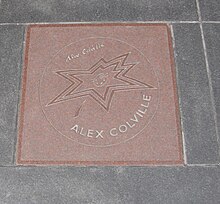Alex Colville
- Birth Date:
- 24.08.1920
- Death date:
- 16.07.2013
- Person's maiden name:
- David Alexander Colville
- Categories:
- Painter
- Nationality:
- canadian
- Cemetery:
- Set cemetery
David Alexander Colville, PC CC ONS (24 August 1920 – 16 July 2013) was a Canadian painter.
Early life and war artist

![]()
Colville House, Mount Allison University
Born in 1920 in Toronto, Ontario, Colville moved with his family to Amherst, Nova Scotia in 1929. He attended Mount Allison University from 1938–1942, graduating with a Bachelor of Fine Arts.
He married Rhoda Wright in 1942 and enlisted in the Canadian Army under the War Artist Program. During his four-year deployment to the European theatre of World War II, he was one of Canada's most prominent war artists.
Career
Colville returned to New Brunswick after the war and became a faculty member with the Fine Arts Department at Mount Allison University where he taught from 1946-1963. He left teaching to devote himself to painting and print-making full-time from a studio in his home on York Street; this building is now named Colville House.
He lived in St. Catharines, Ontario, for three years before moving to Nova Scotia. In 1973, he moved his family to his wife's hometown of Wolfville, where they lived in the house that her father built and in which she was born. The Colvilles have three sons, a daughter, and eight grandchildren. In contrast to many of his contemporaries, Colville aligned himself with the Progressive Conservative Party of Canada and was a card-carrying party member for many years.
Death
Colville died on 16 July 2013 at his home in Wolfville at the age of 92 of a heart condition. His wife Rhoda died on 29 December 2012. Both are survived by their four children, all of which are subjects in his paintings.
Exhibitions

![]()
Alex Colville Star on Canada's Walk of Fame
Colville exhibited extensively across Canada and internationally including at the Tate Gallery in London and the Beijing Exhibition Centre in Beijing. In 1983 an international touring retrospective of his work was organized by the Art Gallery of Ontario.
Alex Colville's work is found in many collections including the Art Gallery of Nova Scotia[1], the Cape Breton University Art Gallery in Sydney, Nova Scotia, the Museum of Modern Art in New York, the Musée National d'Art Moderne in Paris, the National Gallery of Canada in Ottawa, the Centre National d'Art et de Culture Georges Pompidou in Paris, the Wallraf-Richartz Museum in Cologne and the Kestnergesellschaft in Hanover, Germany.
Notable works

![]()
"To Prince Edward Island"
"To Prince Edward Island"
This 1963 painting is perhaps his best-known work.
"Horse and Train"
This 1954 work was inspired by two lines from the poet Roy Campbell:
Against a regiment I oppose a brain And a dark horse against an armored train.
"Horse and Train" is a part of the Art Gallery of Hamilton's permanent collection; Dominion Foundries and Steel, Ltd. (Dofasco Inc) donated the painting in 1957. It appears on the cover of the album Night Vision by Bruce Cockburn. Alex Colville and "Horse and Train" are mentioned in the introduction (and in the story itself) of Nova Scotia fiction writer Barry Wood's short story Nowhere to Go published in England's Postscripts #14 in 2008.
"The Circuit Rider"
His mural in Tweedie Hall at Mount Allison University, known officially as "The History of Mount Allison" or "The Circuit Rider," features a centrepiece of a large rear end of a horse. This "horse's ass painting," as it is often known, is viewed by some as brilliant and by some as appalling. Colville chose not to explain the significance of the work.
"Pacific"
His 1967 painting "Pacific", showing a man leaning against an open door looking out to sea while a Browning Hi-Power pistol rests on a table in the foreground, inspired one of the definitive scenes in the 1995 film Heat with actor Robert De Niro.
"Man on verandah"
Painted in 1953, its sale at auction for $1.287 million set a record for a work by a living Canadian artist. Part of the estate of the late G. Hamilton Southam (1918–2008), it was sold at an auction of Canadian post-war and contemporary art by Heffel Fine Art Auction House on November 25, 2010. Expected to get up to $600,000, the price inflated during a three-way bidding war between two Canadian phone bidders and a person at the auction.
Works in other media
In 1965, Colville was commissioned to design the images on the Canadian 1867-1967 centennial commemorative coin set. The set consists of the following designs: Rock dove on 1 cent coin, rabbit on 5 cent coin, mackerel on 10 cent coin, lynx on 25 cent coin, wolf on 50 cent coin and goose on the 1 dollar coin.
On 22 March 2002 Canada Post issued 'Church and Horse, 1964, Alex Colville' in the Masterpieces of Canadian art series. The stamp was designed by Pierre-Yves Pelletier based on a painting "Church and Horse" (1964) by Alex Colville. The $1.25 stamps are perforated 13 X 13.5 and were printed by Ashton-Potter Limited.
Source: wikipedia.org, youtube
No places

| Relation name | Relation type | Description | ||
|---|---|---|---|---|
| 1 |  | Jean Rochefort | Coworker |
No events set

